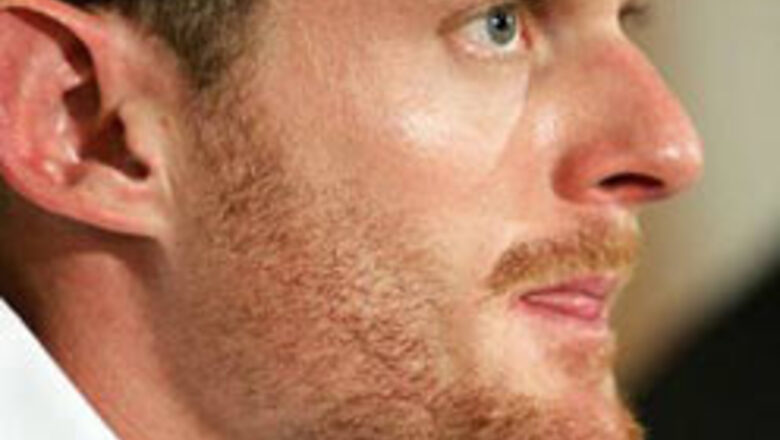
views
London: Justin Gatlin and Floyd Landis made headlines for their sporting achievements in 2006. They were bigger news when they were caught in the year's biggest doping scandals.
Gatlin, who equalled the world record in the 100 metres, and Landis, who won the Tour de France, had positive tests for testosterone revealed within 48 hours of each other at the end of July.
The Americans were the tip of an expanding range of collared takers of banned drugs.
For the first time, a professional darts player, Britain's Robbie Green (marijuana) tested positive. There was also Australian rugby star Wendell Sailor (cocaine), IBF featherweight boxing champ Orlando Salido (nandrolone), Mexican compatriot and WBC light flyweight champ Omar Nino (methamphetamine), and Olympic discus champion Natalya Sadova of Russia (methandienone).
Also caught was a horse, Deep Impact (ipratropium), the Japanese Triple Crown winner, and then-16-year-old Bulgarian tennis player Sesil Karatantcheva (nandrolone). The most bizarre case was the Frenchman who spiked the water bottles of his children's tennis opponents, leading to the death of a 25-year-old. He was sentenced to eight years in prison.
Three-time Olympic champ Marion Jones tested positive for EPO in the first sample but was then cleared, and her former track coach Trevor Graham remained under investigation for several doping violations. Two Pakistan cricketers were busted, banned and then reinstated, and a Spanish doctor allegedly provided doping material to elite cyclists and possibly others.
Gatlin had become a spokesman of drug-free competition. The Olympic and world 100-metre champ equalled the world record of 9.77 seconds in Qatar in May, and was nearing a showdown with Asafa Powell, the original record-holder who equalled it twice more this year.
But it was announced Gatlin tested positive for testosterone and other steroids in April. He is appealing an eight-year suspension, and has promised to cooperate with other investigations by doping authorities.
That cooperation is likely to be bad news for Graham, many of whose star athletes have been suspended or investigated for doping, including Tim Montgomery, Dennis Mitchell, Jerome Young, and Michelle Collins.
Graham was indicted by a grand jury in November on three counts of making false statements to US federal agents. He pleaded not guilty.
Jones tested positive for EPO in June at the US championships, but her B sample was clean and she was cleared.
"That's why there is a B sample," World Anti-Doping Agency director general David Howman said. "She's been exonerated."
Landis is still hoping he can prove the French lab that tested his samples made a mistake.
He won the first Tour de France without retired seven-time champ Lance Armstrong, then officials announced Landis tested positive for elevated levels of testosterone following a remarkable comeback in the Alps which vaulted him back into title contention.
PAGE_BREAK
After initially excusing the testosterone by claiming he'd been drinking the night before, and had naturally high levels in his system, he blamed alleged errors by the Chatenay-Malabry laboratory.
"Even the best people make mistakes," Landis said in a French television interview. "I can't say that the lab is always a bad lab, but I can say that in this case it made some mistakes. I did not take testosterone."
In mid-November, hackers stole data from computers at the lab, and a French newspaper reported the lab made an error on Landis' sample. The error was administrative, the incorrect number was written on the B sample and had nothing to do with the sample being tested.
If Landis is found guilty of doping at US arbitration hearings, he would be formally stripped of the Tour title and face a two-year ban. French organisers say they no longer consider him champion anyway.
The Spanish doping probe known as "Operation Puerto" looked to be a scandal that could ruin cycling forever. Instead, the investigation has yet to yield a single conviction.
Police seized steroids, hormones and the endurance-boosting substance EPO, nearly 100 bags of frozen blood, and equipment for treating blood at a Madrid clinic last May.
When a Spanish police report linked doctors from the clinic with up to 56 cyclists, Jan Ullrich, Ivan Basso and Francisco Mancebo were among nine riders forced to withdraw before the Tour de France.
"At the moment, this whole operation is closed, on the part of the federation at least," Spanish cycling federation president Fulgencio Sanchez said in November. "It is very sad because it is a big scar on cycling and it's killing the image. But all of cycling is responsible, not just one party."
Spanish soccer teams FC Barcelona and Real Madrid both denied another report that players from their teams were linked to Eufemiano Fuentes, the doctor at the centre of the scandal.
An appeals panel overturned bans on cricket stars Shoaib Akhtar and Mohammad Asif by saying that neither had been warned or cautioned against dietary supplements that apparently led to them testing positive for nandrolone. The International Cricket Council and WADA want the case to go to the Court of Arbitration for Sport.
The Turin Winter Olympics included a raid on the lodgings of the Austrian cross-country and biathlon teams, triggered by the presence of former coach Walter Mayer, who was implicated in a blood doping case at the 2002 Salt Lake City Games and banned by the IOC from the Turin Olympics and 2010 Vancouver Games.
Mayer fled Italy after the raid, ending up in a psychiatric hospital after ramming a blockade in Austria.
Weightlifters were mainly responsible for doping stains at the Asian Games in Doha and Commonwealth Games in Melbourne.



















Comments
0 comment